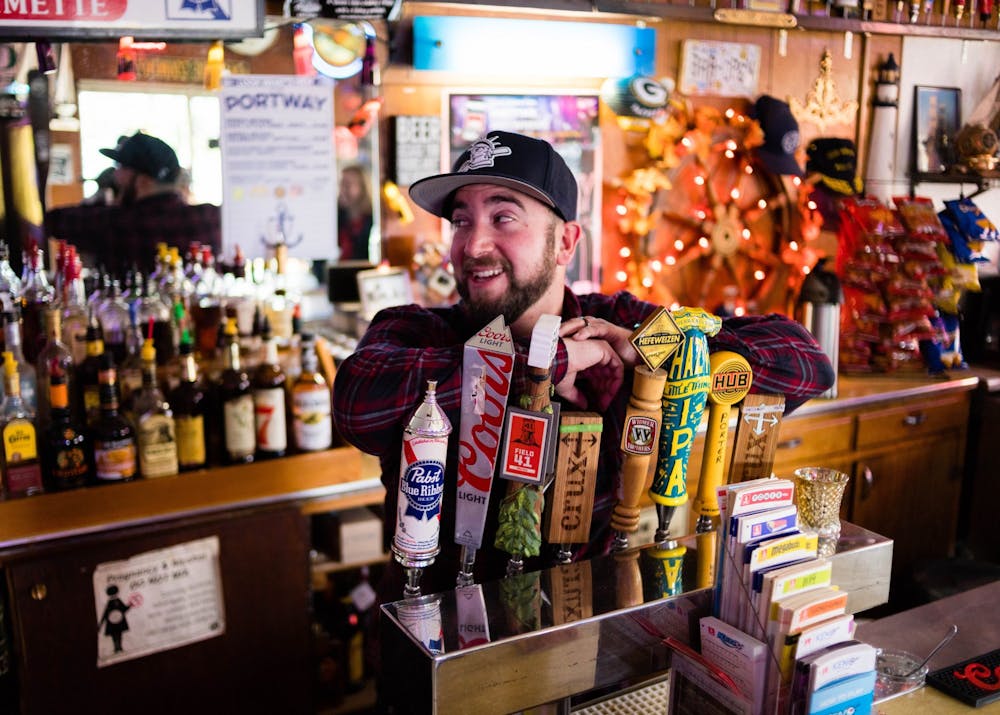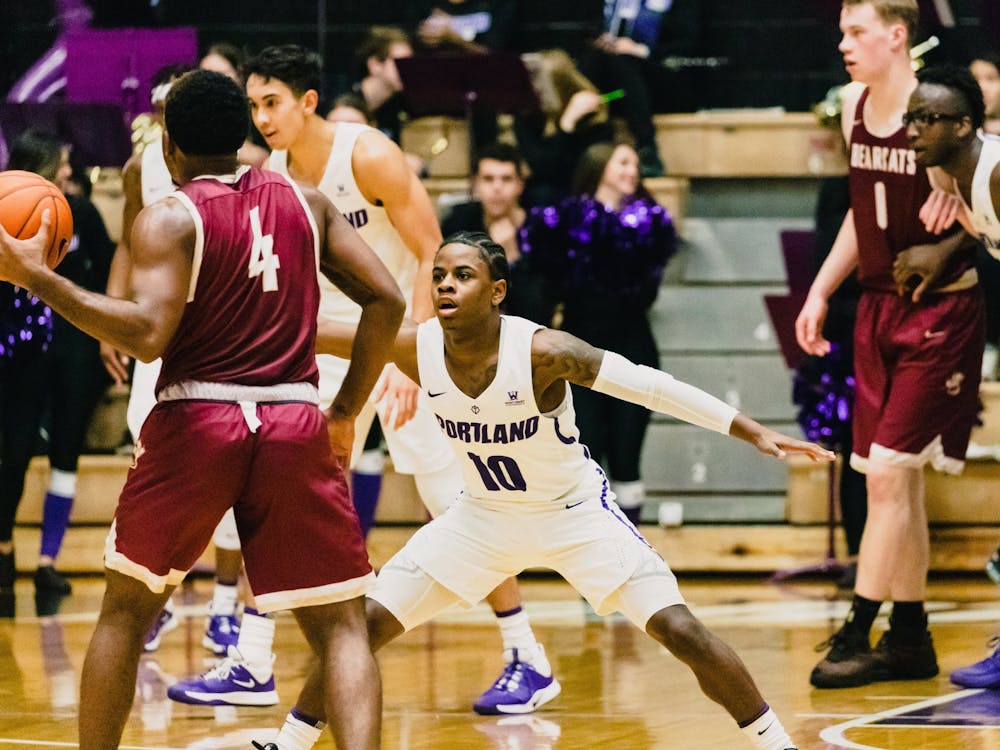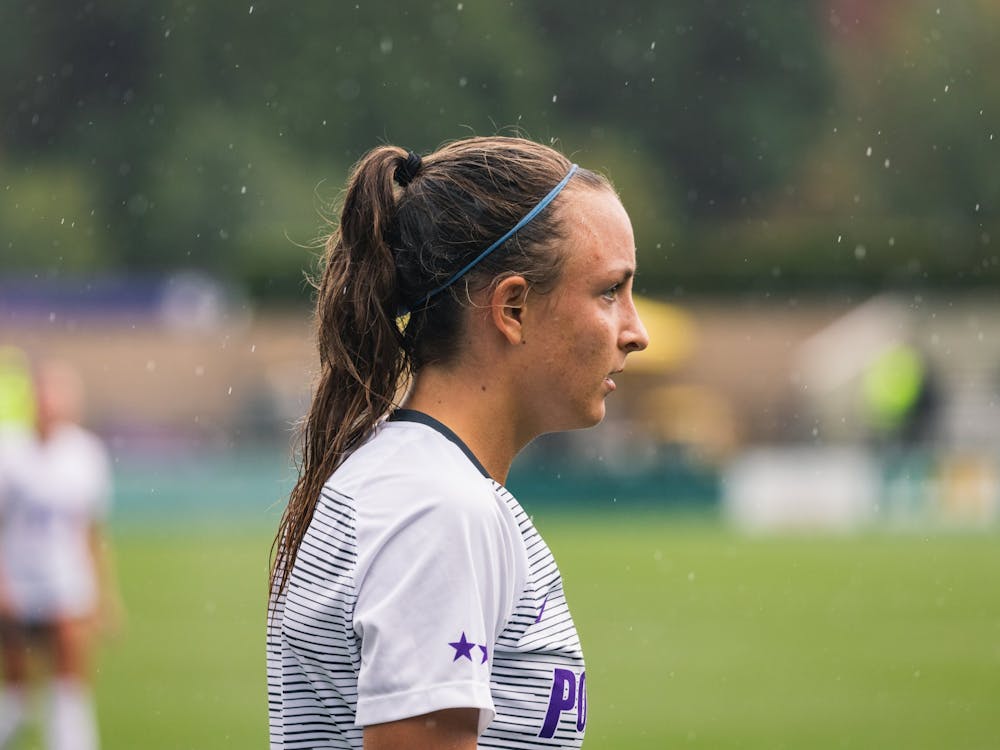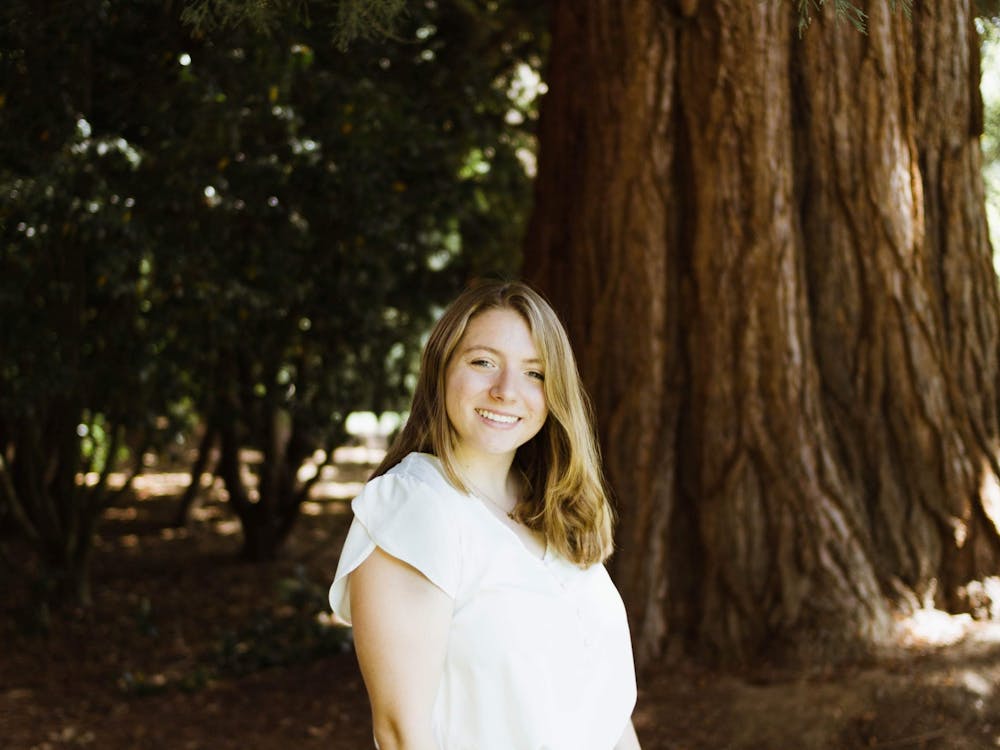Before the University of Portland went online and students went home, Friday nights were something to look forward to. When classes were done and everyone was letting out an audible sigh of relief for making it through one more week, students were always ready to relieve stress in one way or another. When it came to students 21 and over, there was one question that would start circulating as friends debated their evening plans: “Is Tim working tonight?”
University of Portland students who frequented Portway Tavern know that Friday nights are typically reserved for the cozy bar on Willamette, simply because their favorite bartender, Tim Ward, would most likely be working. They trusted that as soon as they walked in, they’d see their friends at the tables, turn to order a drink, and before they spoke, Ward would point at them and suggest their regular. They knew that when they sat down, and Ward asked them how they are as he started making their drink, his question wasn’t just a formality. It was a genuine offer to unload and debrief at the end of the week.
But now, as many seniors have returned home and bars are closed in Oregon, some may be missing their beloved neighborhood bartender. The coronavirus pandemic has left Ward and others applying for unemployment benefits. While it has had a personal impact on Ward, it has also impacted the community he has built around Portway, especially with UP seniors
After working at Portway for about five years, Ward has become an icon amongst UP students. He’s the bartender with the backwards hat that makes everyone feel comfortable as soon as they walk in. He’s the bartender that students bring their new 21-year-old friends to, so they can get to know the man behind their best night-out stories. Ward has made Portway an extension of campus for students of age — a safe haven for one to sit, have a drink, and talk about everything and anything.
“I could ask him any question and he would give me an honest answer,” said senior Sammie Van Norstrand. “He is just a really welcoming person.”
While most students get to know Ward at some point during their time at UP, few have had the opportunity to get to know the man behind the bar.
If you ask Ward where he grew up, he’d pick Prescott Valley, Arizona. While he spent his teen years there, the reality is that Ward spent his childhood moving from state to state — from Tulsa, Oklahoma, to Jacksonville, Florida, to Alberta, Canada — all “for Jesus.”
Ward’s father was a pastor, and his family moved from church to church before eventually settling in Arizona where Ward lived until he was 18 years old. As pastor’s kids, Ward and his three siblings — two older sisters, Stevie and Amanda, and one younger brother, Matthew — grew up with no sugary cereals, no cartoons and no “secular” music.
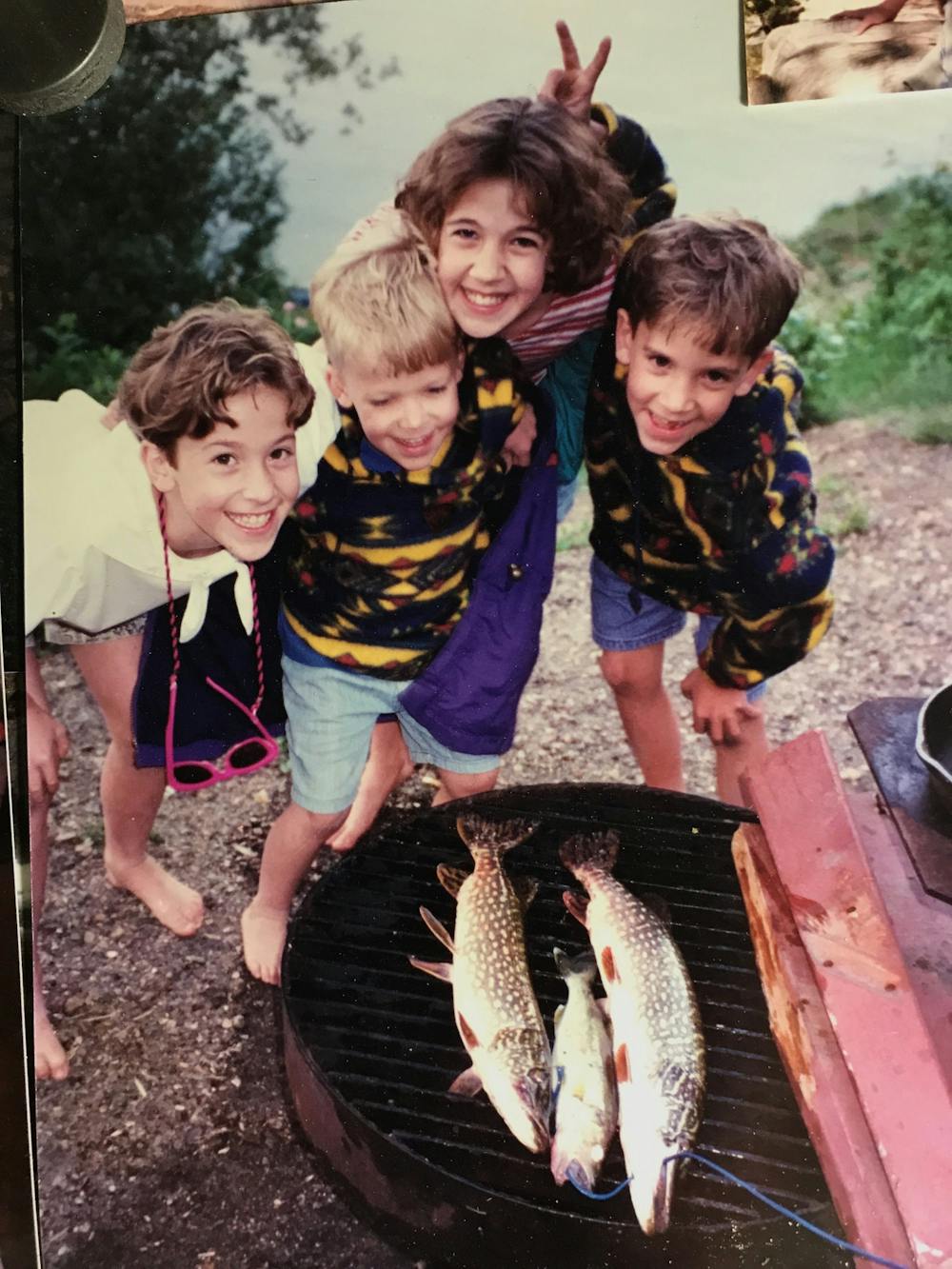
“It was awesome,” Ward said. “My dad is super sweet and just a great guy, And then, being a pastor’s kid, you get invited to everything. Everybody wants you at their birthday party.”
The Ward children were taught at home until high school, so their friends were from the church community. They spend a lot of their time running around churches with other kids but were also expected to maintain a certain demeanor.
“It was difficult in ways because you had to — because we were pastor’s kids — you had to be proper, you had to be prompt,” Ward said.
But Ward recalled his childhood fondly, especially when it came to his siblings. He described his oldest sister, Stevie, as the “alpha” of the four. Matthew, the youngest, as his best friend. And Amanda, the second-oldest, as his fellow “black sheep” of the family as the other middle child. Some of his earliest memories include digging holes in the backyard with Amanda to just “stare into them,” or trying to figure out how to get into the house when Stevie would lock him out for sport, making it an adventure as he had to find a way in before his mom got home.
Another early memory was with his best friend, Nathan Harrison, in Florida. Ward would sleepover at his house on Friday nights so he could eat sugary cereal in the morning and watch Power Rangers. The two would then run through an obstacle course they made up in Harrison’s back yard, which included jumping over the fence and jumping on the trampoline, all while pretending they were Power Rangers themselves.
At 18, Ward moved away on his own for the first time to Huntsville, Alabama, for college, where he was set to study theology with the aspirations of becoming a pastor, like his dad.
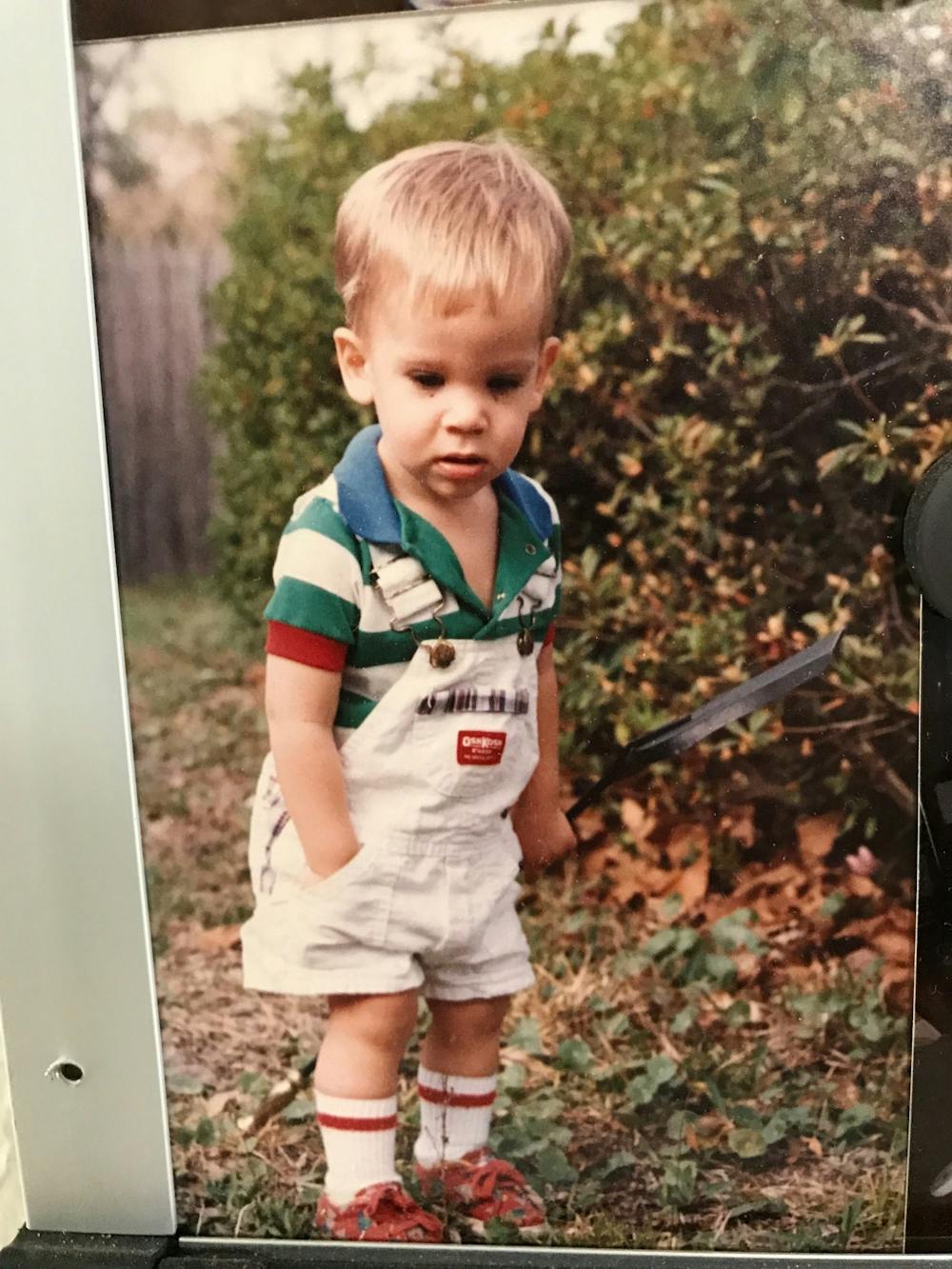
But after moving out, making friends and going to parties, Ward started questioning his path.
“I think it was the ‘sins’ of the world,” Ward said of what changed his mind. “I had a very structured childhood. I never really branched out.”
After gaining certain experiences he had missed out on through high school, Ward decided he wasn’t going to be a pastor. And with that, he packed up. Both of his parents were originally from the Pacific Northwest. So, having family there, Ward moved west.
It was here in Portland where Ward turned 21 and had his first experience drinking legally that many UP students have had at Portway. Except, he went to a blues club with his aunts and uncles because he had recently moved to the area, and got drunk off of old fashioneds. He woke up the next day on his uncle’s futon.
Being a bartender was something Ward had included on a list of things he wanted to do in life. While working at Home Depot as a front end supervisor, he helped out a man who told him he owned several bars. After assisting him, Ward asked about the possibility to work as a bartender. The man liked him so much, he offered to teach him how to bartend, as well.
In 2013, he started bartending at Blue Bird Tavern in St. John’s, where he was trained by the woman who could come to own Portway. During his first shift alone at Blue Bird, Ward refused to serve a stumbling man who proceeded to yell at him. A regular customer, Dan, who happened to be an ex-wrestler, grabbed the guy, carried him to the opposite side of the street, and said, “You live here now.”
In 2014, Ward started working at Portway when the current owner bought the bar and asked if Ward wanted to work weekends. There, some of his regular customers followed him, including Dan.
Ward has only ever had to physically remove a customer himself three times. The craziest work experience he’s had happened in Portway, which resulted in a 30-person brawl. It started with a group of six people outside on the patio, and one guy was caught urinating in the corner. Ward walked over to tell him he had to go, to which other people in the group reacted negatively. Ward went inside to grab Dan, who was there that evening, and helped Ward start ushering the group in through the bar and out to the front.
While inside, with an already-rowdy group calling him names, Ward saw a woman with a purple drink. Portway doesn’t serve purple drinks, so he told her she was done for the night. When he reached over for the drink, the woman threw it at him. A guy next to her took a swing at Ward. By this point, other customers had become aware of what was happening and jumped into action. Everyone else in the bar pushed this group of people to the door. After a while of shoving and cursing, the group eventually resigned to having to go, and finally left. Ward walked back inside, adrenaline pumping, and bought the house a round of drinks as a thank you.
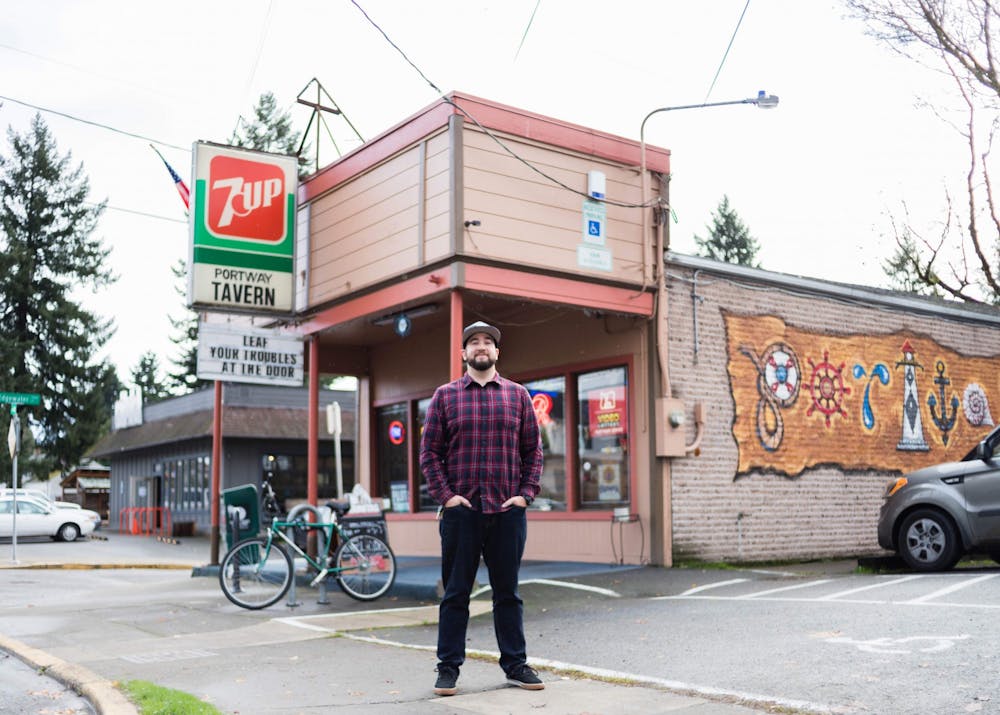
“That’s why you don’t fight the bartender,” Ward said. “Because if you fight the bartender, you fight everyone else in the bar.”
The most challenging part of being a bartender is judging people’s tolerances and making sure everyone is safe, said Ward. What can make that difficult are those that get “sneaky drunk,” as Ward put it, who seem to be in control but are incapacitated with one more drink. Then the task becomes how to make sure they stay safe.
That’s what separates Ward from other bartenders, according to UP students. In Portway, students feel safe enough to act comfortably, as if they are just on another part of campus or in their own homes.
Senior Nate Thomas recalled one Friday night there, when he and his friends accidentally knocked over a few chairs. Instead of removing them from the bar, Ward simply brought them water and told them they were good for the night.
“In any other bar, they probably would’ve just thrown us out there,” Thomas said.
Customers present the most challenging part of bartending. But for Ward, they are also the most rewarding part.
“People are the best,” Ward said. “Especially when you get them drunk, they’re fantastic. Their real personalities come out. Most of the time, they’re just really sweet, fun people. It’s great.”
When it comes to UP students specifically, Ward says they tend to be more composed than other college students he’s served. But they also tend to order too many long island ice teas and AMFs.
“I serve more long island ice teas and AMFs to UP college kids than anybody else. Which is fine,” Ward said. “But UP students are more proper. They’re more composed. They’re not just stupid 21-year-olds that are just unruly and just annoying. For the most part, everyone’s really cool.”
With Pilots as a constant demographic, Portway has become what Ward’s ideal bar would look like — a place for college kids to come in, drink and have fun in a safe environment.
“I wanted a place for someone who’s 21, who doesn’t really know the rules of drinking or whatnot, could come into the bar in a safe environment to enjoy themselves at, to meet other people, to expand their network and expand their knowledge and idea of the world, and just have a good time. And be able to get home safe," Ward said.
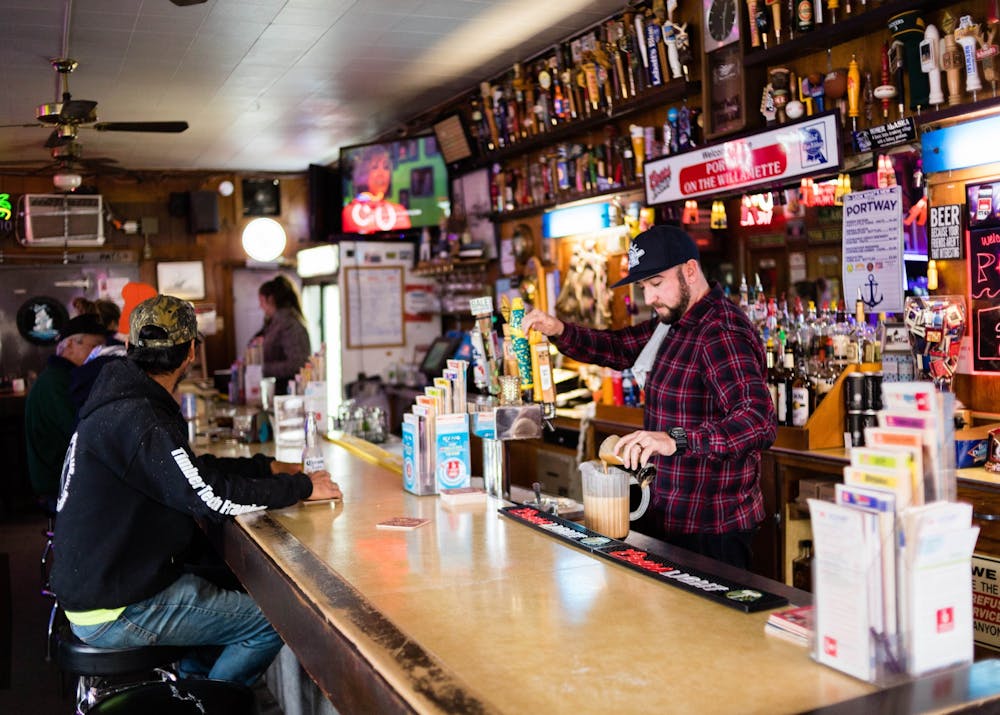
He’s done exactly that. Regulars along with Pilots fill up the small bar on most weekends, bringing the room to life and making it feel larger than it is. The bartender remembers faces, names and stories, prioritizing his relationships with customers because he has “such a high expectation for how to be treated at a bar,” Ward said.
One way Ward has fostered community is through a journal he calls “Dear Book,” where customers can write a diary-like entry that Ward will read once the journal is full of entries. Another is by giving students old camping gear he doesn’t use any more. Yet another is by simply remembering to celebrate people’s birthdays with a drink.
“A lot of people, I think, believe that the T-Room (Twilight Room) is the UP bar. Tim is the UP bartender,” Thomas said. “You don’t know how great this place is. That (Portway) is, in my opinion, the UP bar. ”
While Ward has succeeded in bartending, especially in making Portway what it is, it isn’t what he wants to do long term. Eventually, Ward wants to work in law enforcement as a police officer. He wants to continue to serve the community in a way that he finds helpful.
“I like being around people. I like helping people in difficult situations,” Ward said.
But now, with the coronavirus pandemic forcing bars and restaurants to temporarily close, Ward has been spending his time at home with his wife, Tara, and biking to his friends’ houses to have drinks six feet apart while catching up.
Ward and his friends who have applied for unemployment benefits have found a system completely overwhelmed and unprepared for this situation. Once he heard that bars would be closing for a month, he knew he was actually going to end up being longer than that. Several of his friends filed for benefits and didn’t know if they were going to receive them or waited weeks before hearing anything.
The pandemic has left bartenders and others in the service industry wondering what will happen next. But Ward also felt for members of the class of 2020, who found themselves suddenly having to fit the rest of the semester and graduation celebrations all into one final weekend.
The Friday night after the university announced that it would be going online and sending students home, seniors crowded Portway to spend time with friends and Ward before having to say an unexpected goodbye. Ward could be seen moving around behind the bar making sure every student that walked in that night was served with the same charisma and warmth they usually get at Portway. What Ward hadn’t expected that night was not being able to say a proper goodbye to some of the graduating class.
“I love when graduation happens,” Ward said. “Everyone gets drunk. We dance, we have food … It’s sad that this year, we’re not going to be able to do that for the graduating class.”
Seniors were also upset at having to part with the place that had become familiar for many of them and the man that had made it so welcoming. So, that final Friday night, they had to go to Portway, just in case.
“Everyone knew that that was the place to be on a Friday night,” said Van Norstrand of that last Friday. “We had to go. We had to tell Tim how mad we were. We had to tell him how sad we were … We all had to be together with our favorite bartender at our favorite bar with our best friends. It was the place to be.”
Ana Clyde is a sports reporter and copy editor for The Beacon. She can be reached at clyde20@up.edu.



